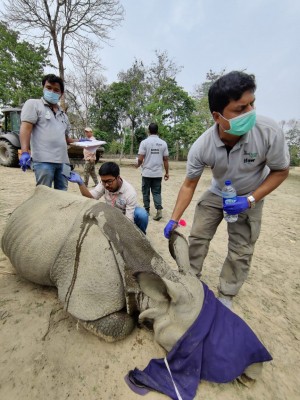
Guwahati, Three rhino calves, two females and one male, which were rescued two years ago during floods at the Kaziranga National Park and Tiger Reserve (KNP&TR) in Assam would be trans-located to the Manas Tiger Reserve (MTR) on Saturday, officials said on Friday.
KNP&TR Director Karmashree P. Sivakumar said that the rhino calves will be shifted from the Centre for Wildlife Rehabilitation and Conservation (CWRC) near Kaziranga, where they were kept ever since they were rescued during the floods in 2019.
He said that these rhino calves have undergone a protocol of rehabilitation for two years before they are being translocated to MTR, 176 km west of Guwahati.
The two female calves were rescued from Hatimura and Kuthuri areas, while the male was rescued from Solmara during the floods that hit Kaziranga in July-August 2019.
The translocation is part of an ongoing effort to increase the number of wildlife at the MTR in Baksa district bordering Bhutan. The national park was devastated for many years due to terror activities and rampant poaching.
Sivakumar said that the convoy carrying the three rhino calves would reach MTR early on Saturday for the scheduled release of the animals in their dedicated 'boma', where they would be kept for a stipulated period for habituation before their final release in the wilderness of the reserve.
"The intra-state rhino translocation would help improve the gene pool of the species," Sivakumar pointed out.
"Under our commitment to bring back Manas, we have augmented the national park with 19 rhinos, including offsprings of the released rhinos, out of the total population of 44 rhinos," he said.
The Kaziranga National Park, extending across eastern Assam's Golaghat, Nagaon, Sonitpur, Biswanath and Karbi Anglong districts, is home to more than 2,200 Indian rhinoceros. With an estimated rhino population of 2,640, Assam has the largest number of Indian rhinos in the world.
Every year, the monsoon floods devastate the KNP&TR and a large number of animals including rhinos are killed by the deluge.


.jpeg)

